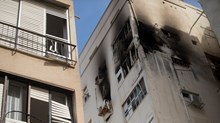Church leaders in Puerto Rico have pledged that the United States Navy will not have the last word about the future of the small Caribbean island of Vieques.On May 4 squads of armed US agents removed more than 200 protesters from a US Navy bombing range on the island. The presence of the protesters, many of whom had been on the Navy land for more than a year, had prevented the US military from using the bombing range on the 21-mile-long island. Vieques, located east of Puerto Rico, is home to 9000 residents, as well as the bombing range, which occupies land seized by the US Navy in 1941 and has been used ever since for a variety of military maneuvers and target practice. Residents claim the military activities disrupt fishing, prevent economic development, and cause a cancer rate almost twice that of the rest of Puerto Rico.The protesters were detained for several hours and transported to Puerto Rico where they were finally released without charges. They were warned, however, that if they again trespassed on Navy-controlled zones of Vieques they could face 10 years in prison and fines of $250,000. Several prominent church leaders were among those detained. They pledged more resistance in response to the Navy's promise to resume within weeks its military exercises on the island. "If the Navy resumes bombing, hundreds of people will return to the restricted zone," Bishop Juan Vera of the Methodist Church of Puerto Rico, told ENI in a telephone interview. Bishop Vera was detained about 5 a.m. at an "evangelical obedience camp" set up by Puerto Rico's Protestant churches at the southern end of the Navy's bombing range. Several Catholics were arrested at their camp about 650 feet away.Bishop Vera said the US agents were polite as long as reporters were present, but several agents became aggressive and threatened violence against the demonstrators once journalists had been removed from the scene. The bishop said several Black and Hispanic agents were visibly ashamed of their role in removing the demonstrators. One Puerto Rican marshal began to cry as she told the protesters they were under arrest.The demonstrators did not resist arrest, the bishop said, and sang hymns as they were led in handcuffs to trucks that moved them to another place on the island, from where they were transported in helicopters to the Navy's Roosevelt Roads facility on the main island of Puerto Rico. They were released about 12 hours later.Wilfredo Estrada, general secretary of the Puerto Rican Bible Society, and Yamina Apolinari, general secretary of the Baptist Church of Puerto Rico, were among those detained, along with two members of the US House of Representatives, Nydia Velazquez, of New York, and Luis Gutierrez, of Illinois."Aren't we being hypocrites by exporting democracy to Bosnia and Croatia, while we don't have democracy in Vieques?" Velazquez asked as she was led away by marshals from the main gate of the bombing area.Lucy Rosario, a Methodist pastor on Vieques who was also arrested, told ENI that after the protesters were released, most returned to Vieques on 20 small fishing boats sent from the island. "The people of Vieques were waiting with joy and pride at the pier when we returned," she said.The arrests marked "the end of one stage of struggle," Rosario said. "Now we begin the next stage of more difficult struggle, when we will have to organize ourselves even better and keep the people informed and active in order to take advantage of their high level of awareness and support for our struggle against the Navy."Among the Roman Catholics arrested were 14 priests and five women from religious orders who had been on the bombing range with the blessing of Bishop Alvaro Corrada del Rio, apostolic administrator of the diocese of Caguas, which includes Vieques. Bishop Corrada was at the bombing range awaiting arrest, but left the evening before the raid took place. He said later that he was pleased that the arrests took place without violence. "The eyes of the world have seen the peaceful, non-violent struggle of the people of Vieques and Puerto Rico. A new discourse has been born that now runs in the veins of the Puerto Rican people. Contrasted with our discourse of peaceful non-violence, the world has witnessed the violence of the Navy and the federal government grabbing the land of Vieques away from men and women of peace. The Navy will eventually leave Vieques because it has lost face before the world."The US government announced that 216 demonstrators were arrested on 4 May. Several others were arrested during the following days as federal agents combed the island's hills in search of a few protesters hiding among the bomb craters.After the raid, the Navy announced it would resume bombing practice within three weeks. US coast guard ships are patrolling the waters off Vieques blocking access by protesters from the sea, and several hundred US Marines are patrolling the fence that separates the military zone from civilian areas of the island.Religious leaders spent many hours in meetings during the days after the arrests, planning the next steps in their campaign. Bishop Vera said church leaders would continue to appeal directly to US President Bill Clinton to change his policy towards Vieques. An ecumenical protest will be held on May 28 in Puerto Rico's capital, San Juan, to denounce the arrests and demand that the US military leave Vieques.Despite threats of jail and fines, church leaders will continue their campaign of civil disobedience. "The US government has opened a Pandora's box with these arrests," Wilfredo Velez told ENI. A Disciples of Christ pastor, Velez was arrested on Vieques in 1979 while protesting against the Navy and spent three months in a US prison."The people of Puerto Rico will continue to go to Vieques, and the US government will have to arrest more of us, many more of us, until it learns that it has to let Vieques live in peace," Velez declared.None of the Puerto Rican activists interviewed by ENI would speak in detail by telephone about plans to again occupy Navy land on Vieques. Bishop Corrada said the May 4 arrests "won't be the last opportunity for civil disobedience," but he refused to be more specific. "We learned this morning that our telephones lines are tapped, so I can't say anything about that," Bishop Corrada said.The campaign to drive the Navy off Vieques has boosted ecumenism in Puerto Rico, as Roman Catholic, mainstream Protestant, and Pentecostal church officials work together. "Puerto Rico is in the vanguard of a new spirituality for a new millennium," Bishop Vera said. "We're tearing down the barriers that kept us separated in the past in order to practice a faith that defends life for all. This isn't an ecumenism where we just meet and drink Coca-Cola together. This is true ecumenism fleshed out in our common commitment to build peace in Puerto Rico."US church leaders have also condemned the raid of May 4. Jesse Jackson, a prominent pastor and civil rights leader who visited Vieques last year, declared in Chicago that the arrest of the protesters was "another vestige of colonial Caribbean politics." He called the detentions "gunboat diplomacy at its ugliest." Before May 4, the National Council of Churches, the biggest ecumenical organization in the US, had urged the Clinton administration to back away from taking action against the protesters.Copyright © 2000 ENI.
Related Elsewhere
See our earlier coverage of this story, "Puerto Rican Christians Unite to Block U.S. Bombings | 'Mourning, but glory' for religious protesters removed from Vieques" (May 5, 2000)
Copyright © 2000 Christianity Today. Click for reprint information.

Annual & Monthly subscriptions available.
- Print & Digital Issues of CT magazine
- Complete access to every article on ChristianityToday.com
- Unlimited access to 65+ years of CT’s online archives
- Member-only special issues
- Learn more
Read These Next
- Trending
 While we pray for peace, we need moral clarity about this war.
While we pray for peace, we need moral clarity about this war. - From the Magazine
 As my doubts about his teachings grew, so did a secret fascination with Jesus.
As my doubts about his teachings grew, so did a secret fascination with Jesus. - Editor's Pick
 Eastern Orthodox poet Scott Cairns reflects on his new collection, his journey of faith, and poetry’s capacity to apprehend inexhaustible realities.
Eastern Orthodox poet Scott Cairns reflects on his new collection, his journey of faith, and poetry’s capacity to apprehend inexhaustible realities.













